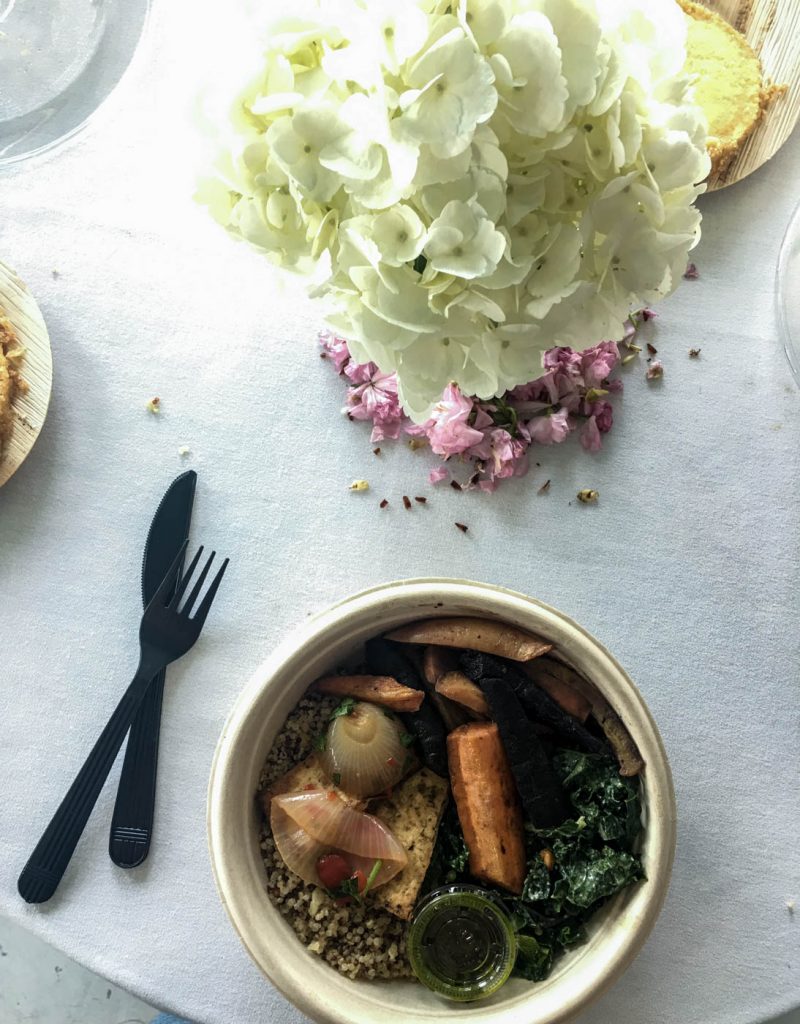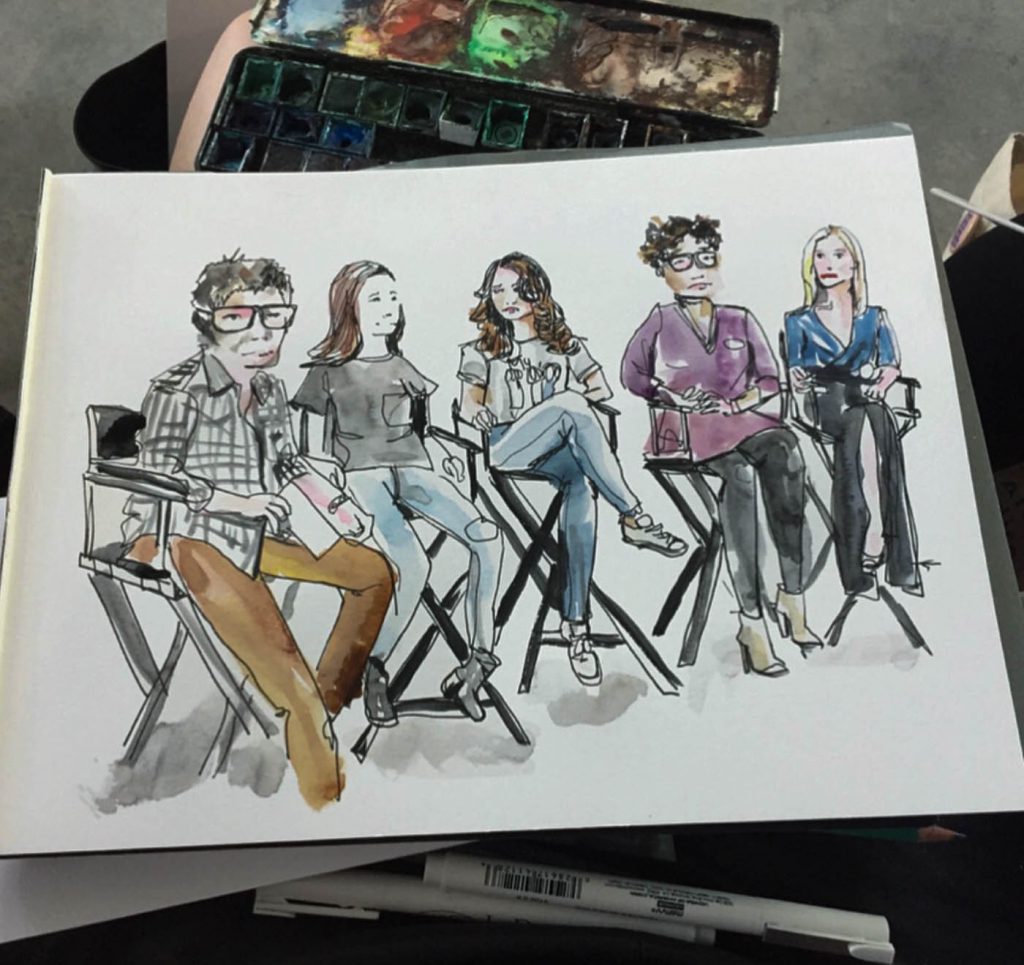Last weekend I was in NYC for the Cherry Bombe Jubilee, a one-day conference celebrating women in food. Women from all over the world are pulled together on this day to share their stories, eat, mingle, learn and network. I’ve written about it before here and here. It’s a full, rich day, one that I feed off for months afterwards.
The morning was spent tearing up (Sharon Richardson shared her story as the founder of Just Soul Catering, a company employing formerly incarcerated women like herself) and clasping our hearts (Ruth Reichl, food writer and former editor of Gourmet Magazine interviewed Dame Ruthie Rogers, chef and owner of the River Café in London). It was a morning of truth and wisdom.

After lunch (quinoa bowls with herbed tofu, roasted rainbow carrots and kale pesto, eaten while standing and chatting at cocktail tables adorned with hydrangeas) we sat back down for a panel discussion on the state of the #MeToo movement in the culinary world.
This is when the room went from tearing up and heart clasping to standing, fist pumping and shouting AMEN! The energy was palpable.
The panel was moderated by NY Times writer Kim Severson and included Toronto restauranteur Jen Agg, chefs Adrienne Cheatham and Mashama Bailey, writer and former server Stephanie Danler and chef Angie Mar.
Severson has been covering sexism, sexual harassment in the restaurant scene and the recent allegations against high profile chefs accused of the above. Severson’s piece on Chef Mario Batali kicked off the conversation. Jen Agg, famous for her Toronto restaurant empire and ongoing fight against misogyny, especially in the kitchen, asked Severson, point blank, why she framed her piece on Batali the way she did. That’s when the gloves came off.
Where were the voices of the women who were treated badly? What happened to them? Where is their voice in all of this? Agg asked these questions exactly as she is pictured above—slumped, arms limp, ankles loose, second from left. It was like she had already given up.
But her comments lit up the room. We heard from servers who had been groped by men, day after day, year after year. We heard from servers who said it’s their job to be subservient; that’s how they get paid. The trick is to only work at establishments that allow servers to quit a table if subservience shifts into abuse. One woman shouted—where the hell is that restaurant? Show me! We heard from chefs who said they’d never step foot in a Batali restaurant again. We heard from Danler, on the panel, who said when you boycott a restaurant, you boycott everyone who works there, from the wine merchants to the dishwashers. Boycotting isn’t necessarily the answer. And we heard from the three other female executive chefs on the panel who continually brought the conversation back to a positive place. It’s much better now than when they started out, they said. We have a voice, and we’re in charge. Positive change, they said, is the only way forward.
“I’m a chef, not a female chef,” Angie Mar told the crowd. “And I speak my mind. I’m a leader in the kitchen, and if I don’t like what’s happening around me, I make it clear. It’s that easy.”
Severson corralled the room by asking for one last question—not a comment—from the crowd. That’s when a young female chef stood up and said something I’ve wondered for a long time.
“I’ve been working on the line for over a year now, and I’ve ignored dirty, sexist comments every day. How to I speak up without looking like a person who is suddenly snapping?”
It was Adrienne Cheatham who spoke. “Honey, we’ve all been there,” she said. “We try to fit in, we don’t want to rock the boat. We don’t want to get fired. But all you have to say to that guy chef, who is young and also trying to find his place in the kitchen, is ‘watch yourself’. Those two words are simple; they say I see you, I hear you, and I don’t like it.”
Watch yourself.
The night before the Jubilee I ate at Estela on Houston. It’s always good and always packed. The host seated me at the bar, directly in front of a bartender who was vigorously shaking a cocktail shaker beside her ear, curls shaking, arm tattoos zigzagging through the air. She smiled, a smile that said, I’ll just be a sec. This drink is almost ready. She poured the pale pink liquid into a coupe glass, finishing it off with a layer of white froth.
She could tell I wanted one from the look in my face. She repeated the steps—Gin, Cynar, grapefruit cordial, egg white—all the while mentoring a male bartender. It clearly wasn’t his first night, but he was not ready to be alone back there. She was kind but firm. Clear.
As she slid the cocktail across the bar, I asked her about its name, printed on the drinks menu: HOW RUDE.
“I actually wanted to call it MIND YOUR OWN BUSINESS. Every week we get to design new cocktails for the menu, and everyone kept asking me what I was going to come up with. I told them to ‘mind your own business.’ Someone actually thought that was the name of the cocktail. It seemed a bit harsh, so I shortened it to HOW RUDE.”
Mind your own business.
How rude.
Watch yourself.
There’s a time and a place for each of these phrases, but they all come from a place of confidence, of happiness, of comfort in the job.
The grand finale of the Jubilee was chef and author Samin Nosrat interviewing Nigella Lawson, the domestic goddess herself. When the conversation veered into the #MeToo movement in the restaurant world, Nigella made it clear that she is a writer and home cook, not a chef. Her focus is cultivating passion and connection by cooking at home and sharing that food with others. She represents the average woman (albeit her cheekbones shimmer from miles away, and she rocks a denim jumpsuit like no other) in that most of us cook at home, far away from the bro culture of restaurant kitchens. It doesn’t mean we’re immune to abuse (Nigella divorced second husband Charles Saatchi shortly after he was photographed in public grabbing her throat), but what I’m sure we all share is a desire to fix a dynamic that doesn’t feel right. To start fresh with a bully. To start saying, quite simply, watch yourself.
*Top Illustration from artist Jessie Kanelos Weiner’s live sketch and water colour session created during the panel discussion. Missing – Angie Mar, who was seated far right. Look out for Jessie on an upcoming episode of The Food Podcast!

